You are a good Project Manager. You have managed many projects successfully and delivered them on time and to budget. Your managers have recognised this and now are preparing to promote you to Program Manager and put you in charge of one of the most prestigious of the organisation’s programs. Are you ready to take on this job?
You are! Why?
Because, unbeknownst to your managers, while managing your projects, you have been doing many things that prepare you for your next job. And, hearing about your impending promotion and your new assignment you have already started planning on what needs to be done to make your new job a success. And, indeed, we are sure that you will be successful because you have done all the right things and are planning to do the right things. All the best for your new job!
In this and succeeding posts, I plan to reveal your secrets to the world. I feel that this will help other budding Program Managers prepare for their big day.

Secret the first
Management gurus tell you that you should always do your current job as if you are doing the job that you want next.
You have followed this very well. You succeeded in understanding where your project fits in in the overall scheme of things and you have been able to suggest improvement ideas based on this.
You took extra efforts to suss out your main stakeholders (key customer contacts, your managers, HR and other internal contacts and vendors) and have been working continuously towards meeting their expectations.
You have taken the pains to understand the other projects in your manager’s portfolio and had volunteered for membership of review and advisory committees of other projects. You had also, where needed, helped other project managers in the execution of their projects.
Of course, you have not neglected your own project in the midst of this extended efforts. You have brought home the bacon and are in the process of delivering your project on time and within budgets.
These efforts of yours is the key aspect that made you get noticed by your managers. This is why you have been promoted and asked to take on the management of one of the organisation’s most prestigious programs.
Secret the second
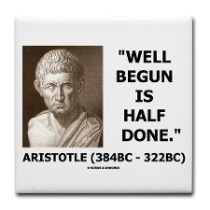
Picture Source: bestuff.com
You find that you have a week’s time between your new job and the old one. This is great. This is the time to recharge your batteries. You don’t waste it.
First of all, you make sure that you relax completely. You clear your brain of the debris from your previous project and make sure that it is ready to take on the new challenge. You spend time with your family (especially your kids). Being with kids is a great way of relaxing yourself. Sit down and have proper meals with them, rather than eating something on the way to work or having a working lunch. You also catch up on your physical exercises: a bit of jogging, walking, some gym, maybe? And maybe some meditation? Remember your new job will be much more stressful than the old one, since it involves a lot of dealing with people.
One important thing you do is to go over in your mind and brush up on the key soft skills required for your new job. Your experience as a project manager has taught you many of those skills. And the course you attended over last year also helped.
You realise that as a program manager, you may have only a dotted line reporting relationship with the project managers of your programs. This fact and the fact that your key job is meeting the expectations of your stakeholders means that your influencing skills need to be very sharp. You therefore read up and discuss with your manager and mentor and get advice on how to sharpen your influencing skills. Your also need to sharpen up your motivation and empowerment techniques.
The other important thing that you do is to ensure that you brush up on the technical skills needed for your new job. This point cannot be overemphasised. You know it is important to understand the technologies involved in the program that you are going to take over. It is important so that you can review the projects within your program – review the estimates, review the plans, understand the risks, review change requests.
You also clearly internalise the difference between a project and a program and the difference between a project manager’s job and a program manager’s job. You do not want to end up behaving like a project manager when you are a program manager.
For one thing a program is an ongoing enterprise focussing on delivery of benefits to the customer rather than delivering a “project” on time and on budget. Your KPIs will state that you will be measured on the continuous delivery of benefits.
Another key thing you do is to ensure that your new program has a program charter. The charter is the document will tell you what your authority is and what your responsibilities are and what is expected of you. It authorises you, on the authority of the Program Governance Board (PGB), to execute the program on its behalf. You can wave this in the faces of departments like admin, HR etc. to ensure that they provide the right kind of support to the program. It also defines the scope of the program which (definition) helps you negotiate with the customer throughout the course of the program. You internalise the the power of this document. In a few pages, it sets out clearly the parameters of the program. Once the program charter is available it can form the basis for your program plan and other documents and your dealings with your stakeholders.
Secret the third
Now, when you start your job as the program manager of this large and prestigious project, you will be prepared. You are no longer a project manager. You are a program manager.
The first thing you plan to do is to meet the members of the Program Governance Committee to clearly understand your mandate, what is expected of you and how you will be measured. This meeting also ensures that you establish one to one relationship with all the members of the Committee. You also plan to work out with the Committee the kind of reporting expected from you.
The next thing you plan to do is meet with all the important stakeholders. Of course, the key people are your direct customers and the supporting team in the customer organisation. At these initial meetings you also plan to get a idea of each of the stakeholders expectations so that you can plan and prepare for meeting their expectations. You also plan gauge and get a first idea of the power and interest of these stakeholders. It is important that you start understanding the politics among your stakeholders and figure out who are supporters if the program, who are neutral and who are clearly antagonistic. You can then plan on strategies to turn the antagonistic ones to being either friendly or at least neutral.
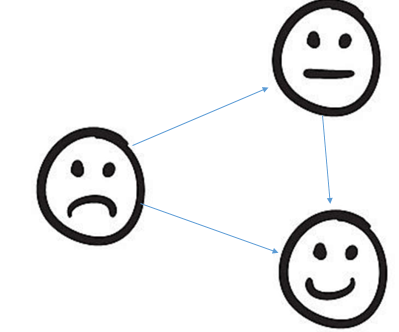
Picture
source: softwaresandlife.wordpress.com
During these initial meetings you also understand the customer’s strategy and the strategic objective to which your program is aligned. This will help you understand the benefits expected by the customer from the program and how you can deliver these benefits at the required time.
Secret the fourth
You then plan to concentrate on setting up the structures for running your program. The first thing you plan to do is set up a Program Management Office (PgMO).
The PgMO will support you in handling aspects around the management of the program from organizing to controlling the program through the life cycle of the program like initiation, planning, execution and closure. The PgMO can help you prepare for reviews by mining for and getting the right data to help you solidify your position and help you create reports demanded by the various stakeholders. The PgMO can also be used as a progress chaser to ensure actions from meetings are completed on time. Issues tracking towards closure and watching for risks can also be done by the PgMO. You know it is important to have a well-designed and empowered PgMO so that you can focus of the strategic aspects of the program.
You also plan to set up and implement technologies for collaboration, reporting, reviews, tracking and monitoring. You also plan to ensure that your Knowledge Management processes are technology enabled.
As a project manager you were quite insular. You rightly wanted your project to succeed and you did all that was required for that. As a program manager, you know have to reach out more. That is why you plan to use the social media to talk about your program, get inputs, suggest solutions to the others and look for changes in the environment that may necessitate changes in your program.
Another area you plan to focus on is program risks. Unlike project risks, program risks are more difficult to get your arms around. Because they affect benefits delivery, return on investments, strategy etc. You plan to understand what the risks are and plan for their mitigation.
You understand that project commercials and contracts were easy, but program commercials and contracts can be very complicated. You will need to report on benefits delivered against costs. This can become quite complicated. Also, there may be contracts with multiple vendors and contractors that you need to grapple with.

Picture
source: vectordesigndownload.com
Secret the fifth
You have also planned how you will allocate your time and effort in the running of your program. This allocation is quite different from when you were running your project. In fact, you have drawn out a small chart with your proposed time and effort allocation so that you can use it as a reference whenever you are in danger of slipping into a “project manager” mode.
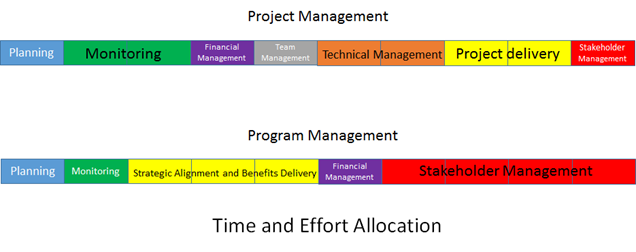
Well, if you know and do all these things you will turn out to be a good program manager that your organisation will be proud of. Of course, you do understand that all the above is only as good as the person doing this, Finally it is up to you to bring the best out to make these things work.
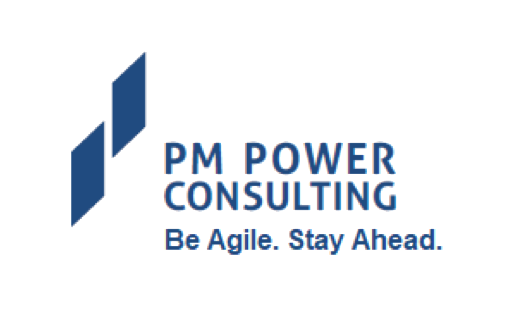
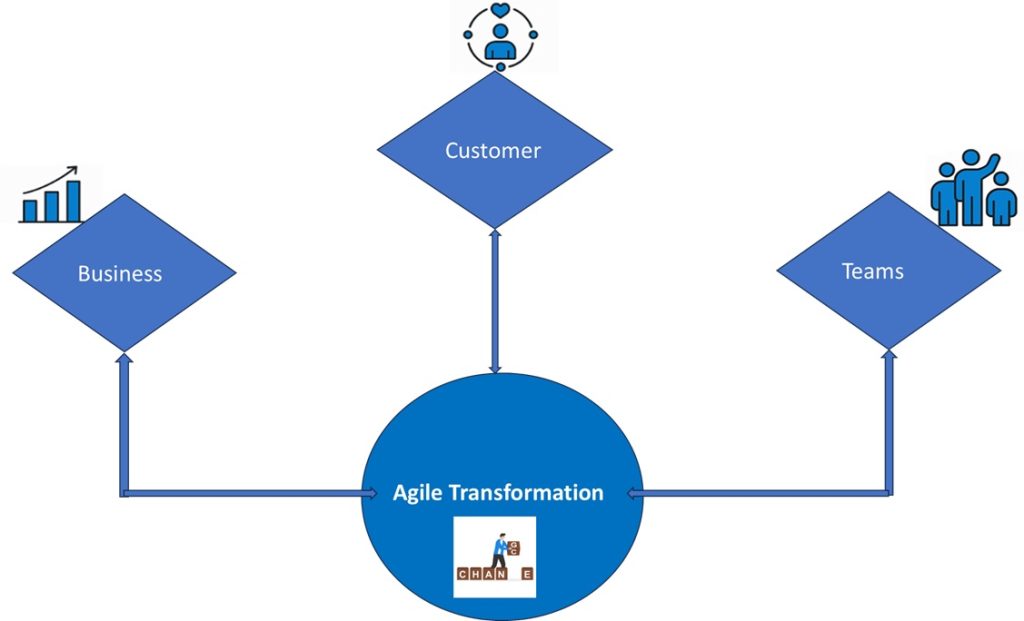


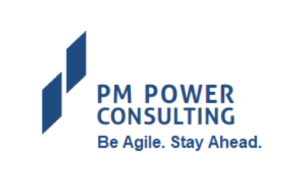
One Response